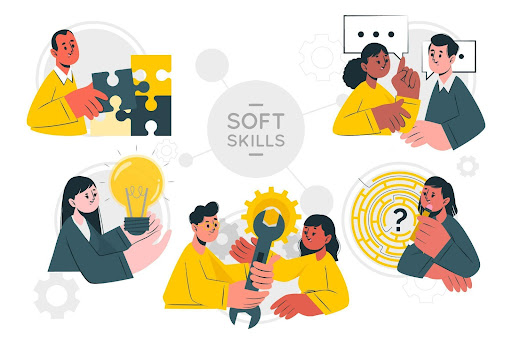Business landscape is evolving and upgrading constantly and it’s important for students studying business to keep up with the evolution. A college or a programme that helps students keep up with the latest industry trend has become extremely necessary.
In this blog we will be primarily focusing on PGDM programmes, especially the future trends in PGDM and how it can guarantee you a successful professional life.
We’ll also discuss how technology is playing a role in PGDM programmes, including the impact of AI, machine learning, big data, and analytics. Additionally, we’ll examine globalisation in PGDM programmes and how ethical and sustainable business education is becoming increasingly important.
Table of Content
- Future Trends in PGDM Education
- How Technology Is Shaping PGDM programmes
- The Growing Demand for Ethical and Sustainable Business Education
- The Future Job Market for PGDM Graduates
- Conclusion
Future Trends in PGDM Education
The future of PGDM education is moving towards more specialised programmes, catering to the evolving needs of industries. Let’s have a look at some of the future trends that you may see in your PGDM programme:
Increase in Specialisation
PGDM programmes are expanding their horizons by offering a wider range of specialised areas of study. More options for PGDM specialisation allows students to choose a major that aligns with their professional interests and goals.
By focusing on specialised areas, these programmes provide in-depth knowledge and skills in specific business domains, ensuring that graduates are well-equipped with the necessary expertise to excel in their chosen fields.
We at Thakur Global Business School provide students with numerous specialisation options in marketing, finance, human resources and operations. You can check out our curriculum on our website.
Emphasis on Soft Skills and Leadership Training
Aside from all the theoretical and practical knowledge, students also need soft skills and leadership abilities to succeed in their careers. We can see PGDM programmes focusing more on these skills in the near future to prepare students for management roles.
Employers highly value candidates with strong soft skills, making it essential for PGDM graduates to possess these abilities. Furthermore, a Diploma in business management provides ample opportunities for students to enhance their interpersonal and managerial skills, equipping them with the necessary tools to excel in the business world.
We have organised guest lectures on topics like ‘communicating your way to success’, ‘expectation vs reality’ and ‘communicate to influence’ to ensure students are equipped with the right skills before entering the business world. We take our guest lectures, seminars and workshops seriously and it will only be getting better in the future.
Entrepreneurship and Innovation
The startup culture in India is on a constant rise and it won’t be declining any time soon. Many PGDM programmes have started focussing more on the topics of entrepreneurship and innovation so that they can create future entrepreneurs.
Best business schools in India have started including entrepreneurship and innovation in their curriculum. This is one of the best parts of PGDM programmes. PGDM curriculums, unlike MBA programmes, are not rigid and change annually so that students can get updated.
These were some of the future trends that may become common in PGDM programmes, helping students. There are many other trends worth noting that can be very helpful when included in a PGDM programme.
How Technology Is Shaping PGDM programmes
Technology is spreading its roots everywhere and the education sector is no exception. Let’s have a look at how technology is having an impact on PGDM courses:
The Role of AI and Machine Learning in Business Education
AI and machine learning have significantly transformed business education by automating tasks and providing data-driven insights. In PGDM programmes, these technologies can be used to optimise the learning experience.
Machine learning models can be used to analyse complex business scenarios, improving students’ problem-solving skills which is essential in the business world.
AI chatbots and virtual assistants offer round-the-clock support to PGDM students, ensuring a seamless learning journey.
By integrating AI and machine learning into the curriculum, PGDM programmes prepare students for the future of work and equip them with the skills needed to thrive in a rapidly changing business landscape.
The Impact of Big Data and Analytics on PGDM Curriculum
In response to industry demands, PGDM programmes are incorporating courses on data analysis and data-driven decision-making. Every business is extensively using data to improve their sales and profits making big data and analytics essential for the near future.
This shift is driven by the increasing importance of understanding data analytics in the business world. Graduates need to be equipped with the necessary skills to leverage big data and analytics tools, gaining insights and making informed business decisions.
These updates in the PGDM curriculum ensure that students are prepared for data-driven business environments, where the ability to analyse and interpret big data is crucial. This ensures that PGDM graduates are well-prepared for the future of business.
The Growing Demand for Ethical and Sustainable Business Education
The importance of ethical and sustainable practices in business education is increasing significantly. PGDM programmes are meeting this demand by offering courses on corporate social responsibility, sustainability, and ethics.
The Inclusion of Sustainability and Social Responsibility in the PGDM Curriculum
PGDM programmes showcase a strong emphasis on sustainable practices and social responsibility. Students delve into topics like environmental sustainability and social impact, enabling them to develop sustainable business models and strategies. By understanding the role of businesses in addressing societal challenges, graduates are equipped to lead organisations towards a more sustainable future. Not only do these practices contribute to cost savings and resource conservation, but they also instil a sense of corporate citizenship.
Preparing Future Business Leaders for Ethical Challenges
PGDM programmes focus on preparing future business leaders to not only become successful but also tackle ethical challenges with a strong ethical mindset. These programmes offer ethics courses that equip students with the necessary skills to navigate ethical dilemmas. By analysing ethical frameworks and making principled decisions, students learn how to uphold ethical behaviour within organisational culture.
Real-world case studies are also incorporated to help students develop ethical leadership abilities. Through these efforts, PGDM programmes aim to cultivate a generation of business leaders who can effectively address ethical challenges in their careers.
The Future Job Market for PGDM Graduates
In the future job market for PGDM graduates, there will be an increasing demand for specialised skills in emerging industries such as artificial intelligence and data analytics. While technical expertise is crucial, soft skills like leadership, communication, and emotional intelligence will also play a vital role in career success.
Emerging Job Roles and Industries for PGDM Graduates
PGDM graduates are equipped with the skills and knowledge to excel in various industries and job roles. The increasing demand for business analytics has created numerous opportunities for PGDM graduates.
In addition, industries such as information technology, logistics, and supply chain management are actively seeking PGDM graduates to enhance their operations. Specialisations like human resources and marketing management offer exciting career prospects for PGDM graduates.
Whether in domestic or international business settings, PGDM graduates have a wide range of employment options available to them.
The Expected Salary and Career Growth for PGDM Graduates
PGDM graduates can anticipate lucrative salaries and swift career advancement. The average salary for PGDM graduates varies, influenced by factors such as specialisation and the reputation of the institute. As they gain experience and expertise, PGDM graduates have the potential to secure high-paying managerial positions.
PGDM programmes equip students with the necessary skills and knowledge for upward mobility in the corporate world. Successful PGDM alumni often ascend to leadership roles and make substantial contributions to their organisations. The future looks promising for PGDM graduates in terms of both salary prospects and career growth.
Conclusion
The future of business education is evolving to meet the demands of a rapidly changing business landscape. PGDM programmes are embracing trends such as online learning, specialised programmes, and an emphasis on soft skills and leadership training. Technology is also playing a crucial role, with AI, machine learning, big data, and analytics shaping the curriculum. If you are someone planning to pursue a PGDM programme you must embrace these trends as they ensure a successful career in the ever-changing business world.





















